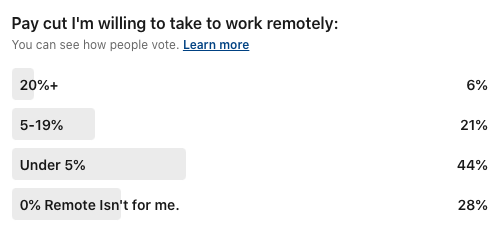On episode 76 of The HR Famous Podcast, longtime HR leaders (and friends) Tim Sackett, Kris Dunn, and Jessica Lee come together to discuss back-to-school season, Google’s new internal calculator for pay cuts and secretly working two remote jobs.
Listen (click this link if you don’t see the player) and be sure to subscribe, rate, and review (Apple Podcasts) and follow (Spotify)!
Show Highlights
1:30 – It’s back-to-school season! JLee is feeling ready for the season after getting back from a vacation to Turks & Caicos. Her kids are going to be in person at school all day.
3:45 – Tim’s last child is a senior in high school and they are ready for him to get out of the house. His wife doesn’t know how she’s going to make it through the year…
5:30 – In a shoutout to “no one really knows anything,” KD mentions a report from the UAB that said 40% of a state is going to get Covid between July and September because of the Delta variant. The majority will show no symptoms. Is that bad? No one really knows. Songs from the band Chicago are cited.
9:30 – Google’s rolled out a new internal calculator explaining potential pay cuts to employees who choose to work remotely and people are getting penalized. Reuters reported on screenshots of this calculator.
12:00 – JLee gives Google a thumbs up for being a leader on the forefront of salary changing by location.
14:00 – Tim discusses the thought process that this is built on: I should get paid the same regardless of where I live. The reality is that every market substantiates different pay levels.
17:45 – JLee mentions that this decision is a hard one to make and someone has to be the leader on this forefront. She also mentions that there’s definitely room to change if there’s backlash.
22:45 – Are people taking on second jobs while they work from home? There’s a book coming out from an individual about their story working two remote jobs. Check out more at their website. They came out with 12 rules about working two remote jobs, the top of the list is “don’t talk about your other job.”
26:50 – One of their rules is “be average.” JLee says that this is when it falls apart. She says to kick butt at job No. 1 and work your way up there, instead of being average at two different jobs.
29:00 – KD asks the crew what percentage of adults work two jobs. JLee says 10% and Tim and KD say 1%.
30:30 – Tim had this happen to him with a contractor who was working two jobs.
34:30 – Tim thinks that people are too afraid of retaliation/being found out so he’s sticking with his 1% guess of people that work more than one job remotely.

